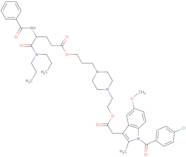Proglumetacin
CAS: 57132-53-3
Ref. 3D-FP39594
| 5mg | Discontinued | ||
| 10mg | Discontinued | ||
| 25mg | Discontinued | ||
| 50mg | Discontinued | ||
| 100mg | Discontinued |
Product Information
- 1H-Indole-3-acetic acid, 1-(4-chlorobenzoyl)-5-methoxy-2-methyl-, 2-[4-[3-[[4-(benzoylamino)-5-(dipropylamino)-1,5-dioxopentyl]oxy]propyl]-1-piperazinyl]ethyl ester
- 3-(4-(2-Hydroxyethyl)-1-piperazinyl)propyl DL-4-benzamido-N,N-dipropylglutaramate 1-(p-chlorobenzoyl)-5-methoxy-2-methylindole-3-acetate (ester)
- 3-{4-[2-({[1-(4-chlorobenzoyl)-5-methoxy-2-methyl-1H-indol-3-yl]acetyl}oxy)ethyl]piperazin-1-yl}propyl N~2~-benzoyl-N,N-dipropyl-alpha-glutaminate
- Proglumetacin [INN:BAN]
- Proglumetacina [INN-Spanish]
- Proglumetacine
- Proglumetacine [INN-French]
- Proglumetacinum
- Proglumetacinum [INN-Latin]
Proglumetacin is a bicyclic heterocycle that inhibits the cyclooxygenase enzyme and the synthesis of prostaglandins. Proglumetacin has been shown to be effective in treating symptoms of inflammatory bowel disease, including ulcerative colitis and Crohn's disease. Proglumetacin has also been found to inhibit the production of pro-inflammatory cytokines, including tumor necrosis factor-α (TNF-α) and interleukin-6 (IL-6). Proglumetacin has been shown to have inhibitory properties against infectious diseases such as HIV, influenza, herpes simplex virus type 1, and human cytomegalovirus. It also has anti-inflammatory activity against autoimmune diseases such as rheumatoid arthritis.





